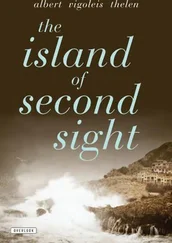It was a wife’s social and familial duty to birth a son, who would lengthen her husband’s lineage. But every family in the seaside villages of Jeju was most grateful for the birth of a daughter, because she would always be a provider. In this regard, our family was not so fortunate, because we only had four females in our household: Grandmother, Mother, me, and Little Sister, who, back then, was only eleven months old and too young to help. Still, one day, she would work with me to help our parents pay their debts, chip in to build a better home for their old age, and possibly even contribute to sending our brothers to school.
On the summer day eight years ago when I first met Mi-ja, Father stayed home, as he usually did, to take care of my siblings. Mother and I set out to our dry field to weed. She looked like a misshapen melon. Her stomach bulged with what would soon be my third brother, while her back was bent under the weight of a basket stuffed with tools and fertilizer. I carried a basket filled with drinking water and lunch. Together we walked through the olles. In the village, the stone olles around houses were high enough to prevent neighbors from peeking inside. Once outside the village, the olles were about waist-high. Each plot of land was also surrounded by stone walls, which had less to do with limning a family’s property than with blocking the relentless wind, which could snap long-stemmed crops in two. No matter what their use, the olles were made from volcanic rocks so large they must have required at least two of our ancestors to put each one in place.
Just as we reached our land, Mother stopped so abruptly that I bumped into her. I feared we’d stumbled upon Japanese soldiers, but then she yelled, “You! There! What are you doing?”
I stood on my tiptoes to peer over the stone wall and saw a little girl crouched among our sweet potato plants, her hands digging into the earth. If Jeju was known for its Three Abundances of wind, stones, and women, it was also acknowledged for lacking three other things: beggars, thieves, and locked gates. But here was a thief! Even from afar, I could see her making calculations. She couldn’t escape through the opening in the wall, because that would put her in the olle with us. She leapt up and galloped to the far side of the field. Mother pushed me and yelled, “Catch her!”
I dropped my basket and dashed along the olle that edged the field. I turned left into the neighboring plot, galloped across it, scrambled over the far stone wall, and dropped to the other side. When I reached the next wall, I climbed to the top, and there she was on the opposite side below me, scurrying like a rat. Before she could sense me, I jumped on top of her and wrestled her to the ground. She fought hard, but I was far stronger. Once I’d pinned her wrists, I could see her face. Clearly, she was not from our village, because no one here was that pale. It was as if she’d been kept inside her entire life. Or she was a hungry ghost—a type of spirit who restlessly roams the earth and causes trouble for the living. Under any other circumstances, I would have been petrified. Instead, my heart thumped in my chest. The chase. The capture.
“Let me go,” she cried piteously in Japanese. “Please let me go.”
That’s when I got scared. We all had to speak Japanese for the colonists, but this girl’s tones were perfect. What if I’d tackled a Japanese girl? Then I registered the tears that ran down her cheeks toward her ears. What if I was caught torturing a Japanese girl?
I was about to free her when Mother’s voice floated down from above us. “Bring her to me.”
I looked up and saw Mother gazing down at us from over the stone wall. I carefully lifted myself off the girl, but I kept a firm grip on her arm. I pulled her to her feet and pushed her ahead of me. She didn’t have a choice but to climb over the wall. Once we were both on the other side, Mother slowly scanned the girl from head to toe and back again. Finally, she asked, “Who are you? Who do you belong to?”
“My name is Han Mi-ja,” she said, wiping away her tears with the heels of her hands. “I live with my aunt and uncle in the Sut-dong section of Hado.”
Mother sucked air in through her teeth. “I think I know your family. You must be Han Gil-ho’s daughter.”
Mi-ja nodded.
Mother stayed silent. I could tell she was upset, but I had no idea why. At last, she spoke. “Go ahead then. Tell me why you would steal from us.”
The words flooded out of Mi-ja’s mouth. “My mother died when I came out of her. My father died two months ago. Heart attack. Now I live with Aunt Lee-ok and Uncle Him-chan, and—”
“And they don’t feed you,” Mother interrupted. “I understand why—”
Defiance skittered across Mi-ja’s features. “My father was not a traitor. He worked for the Japanese in Jeju City, but that doesn’t mean—”
Mother cut her off to recite a familiar aphorism. “If you plant red beans, then you will harvest red beans.” This meant that a child’s character and behavior came from what the parents planted. “No one likes a collaborator,” she said matter-of-factly. “The people in all seven villages of Hado were ashamed when your mother and father chose that life. And consider your given name. Mi-ja. So Japanese.”
Even at my young age, I knew my mother was taking a risk speaking so openly against the Japanese and those who supported them.
Mi-ja’s hands and face were smudged with dirt. Her clothes were finer than any I’d seen before, but they were filthy. At some point during her escape, she’d lost her scarf, and her hair looked matted, as though no one had put a comb through it in weeks. But what struck me most was how thin she was. She was pitiful, but Mother didn’t let up.
“Let’s see what’s in your pockets,” she demanded.
Mi-ja searched through her clothes, making sure she showed Mother everything. She held up a lump of coal, then she put it back in her pocket. She carefully wiped her dirty hand on her shirt, reached up under her sleeve, and pulled out a book. It was the first one I’d seen, so I couldn’t be impressed or unimpressed, but Mother’s eyes widened. In her nerves or out of fear, Mi-ja dropped it. Mother bent to pick it up, but Mi-ja grabbed it first. She gave Mother another defiant look.
“Please. It’s mine,” she said, quickly secreting the book back up her sleeve. She reached into her last pocket, pulled out a closed fist, and then dropped a handful of baby sweet potatoes barely bigger than pebbles into Mother’s palm. Another long silence hung over us as Mother rolled them back and forth, examining them for damage. When she next spoke, her tone was still loud, as it always was, but kinder.
“You’re a lucky girl,” she said. “If I were someone else… But I’m not. You’re coming back to our field, and you’re going to replant these. When you’re done, you’re going to help us. If you do a good job, we’ll share our lunch with you. If you don’t run away, if you obey, if you follow my orders, I’ll let you come again tomorrow. Do you understand?”
I didn’t fall in love with Mi-ja on that first day—not when I was riled from the chase, confused by my mother’s reaction to her, and mad that I had to share part of our lunch with a thief. Here’s what did happen: Mi-ja listened to everything Mother told her to do, but she followed what I did. I showed her how to plant the tubers, then stomp on the soil to keep it from flying away in the wind. We spent the rest of the time pulling weeds and aerating the soil with a three-pronged tool. As the light changed and the sky began to glow crimson, she helped us pack.
Mother said, “I will see you tomorrow. No need to tell your aunt and uncle.”
Читать дальше












